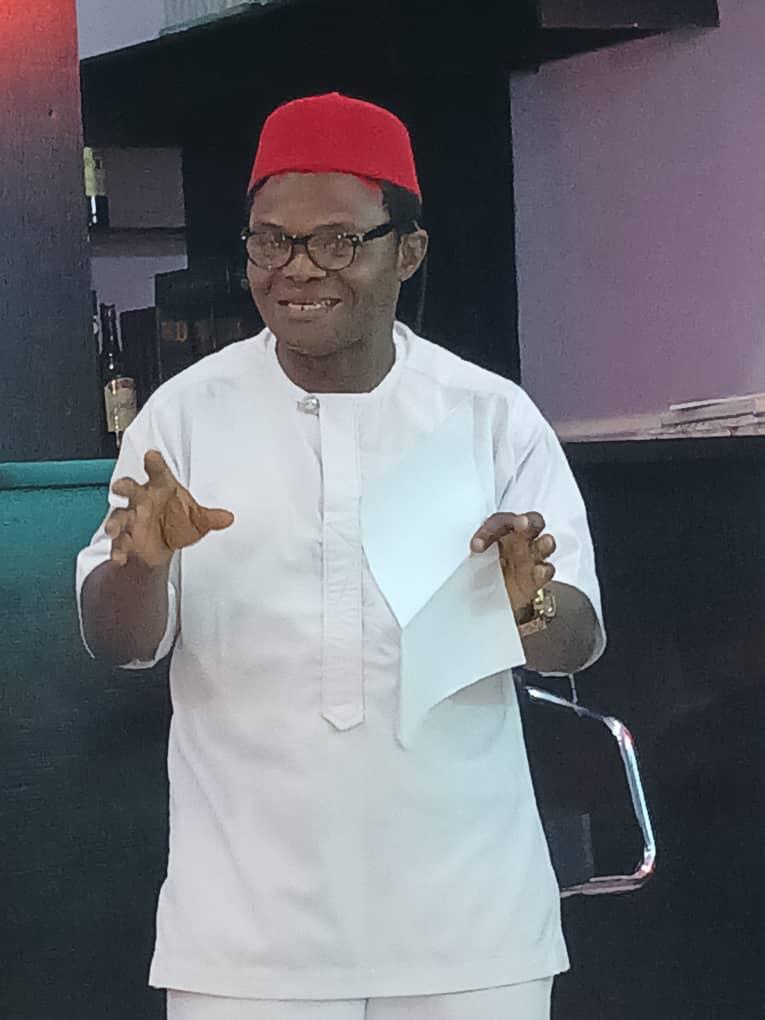IGWEBUIKE IDEOLOGY AS A FRAMEWORK FOR COLLECTIVE LEADERSHIP AND COMMUNITY DEVELOPMENT

(A Lecture delivered at the Retreat / Workshop for the Inauguration of the Royal Cabinet Members of His
Royal Highness, Igwe Professor Ikenna S. Omeje, Eze Obule II of Edemani Amebo Autonomous Community, Ibagwa-Aka in Igbo-Eze South L.G.A., Enugu State, Nigeria, held at the
Banquet/Seminar Hall, King David Lounge & Suite, Ibagwa-Aka, 28th October, 2024).
By
Professor Ejikemeuwa J. O. NDUBISI
Preamble
I would like to express my deepest gratitude for the honour and privilege of being chosen to deliver this lecture today. It is truly humbling to stand before this distinguished audience and most especially before our great Monarch whose reign, within this short period of his installation as the Royal Father, has brought great pride and progress to Edemani Amebo Autonomous Community. What we are witnessing today is a testament to the wisdom of placing the right person in the right position. Under the leadership of Eze Obule II our community has flourished, guided by his profound knowledge as a renowned academic and his unwavering dedication as a dynamic administrator. Igwe, your insight and vision are not just felt in the academic world, but also in every corner of our beloved community, where your presence inspires unity, progress, and respect for our culture and tradition. We are truly blessed to have a Monarch like you, a distinguished Professor and visionary leader, one who embodies the spirit of leadership, scholarship, and community development. Long may you reign, Igwe! May your wisdom continue to light our path, and may your reign be filled with peace, prosperity, and the admiration of all Edemani Amebo people and beyond.
It is said that a single tree cannot make a forest and also that two good heads are better than one. This is the basic reason for the selection and inauguration of the Royal Cabinet members. The Cabinet members are men of proven integrity who are expected to work with the Igwe for the good and betterment of the entire community. It was Socrates who said that knowledge is virtue (Omoregbe, 2001) and Francis Bacon echoed that knowledge is power (Omoregbe, 2002). This explains why we are here today to gain the right knowledge – to be properly equipped concerning the roles and duties of the Royal Cabinet members and also to learn how best to engender progressive development in our community. Today, I am going to discuss in brief the profound relevance of Igwebuike ideology as a framework for collective leadership and community development. This ideology that is deeply rooted in Igbo philosophy and also propagated by my friend – Prof. Ikechukwu Anthony KANU, is expected to guide our actions as leaders entrusted with the welfare of our people.
Understanding Igwebuike Ideology
The term Igwebuike is an Igbo phrase that means “strength in unity” or “the strength that comes from numbers”. Derived from the words igwe (multitude), bu (is), and ike (strength), it emphasizes the collective power that emerges when individuals come together for a common purpose – ofu mkpuru aziza anaghi aza ezi (a broom stick cannot sweep). This ideology celebrates the African communal spirit which sees the individual as part of a larger whole, a vital piece of the community, with each person contributing to the greater good; anyukoo amiri onu, ogba ufufu (when people urinate together, it foams). The Igwebuike philosopher, Prof. Ikechukwu Anthony Kanu explains that as an ideology, Igwebuike rests on the African principles of solidarity and complementarity. The notion of Igwebuike is such that when human beings gather together in one accord, they are powerful or can constitute an insurmountable force (Kanu, 2016a; Kanu, 2016b; Kanu, 2016c; Kanu, 2017a; Ndubisi, 2019).
Igwebuike ideology is strongly anchored on the African proverb: If you want to go fast, go alone; but if you want to go far, go together (Kenyatta, 1965; Tutu, 2000). It suggests that when we work alone, we may be able to achieve quick results but might lack long-term sustainability. Igwebuike ideology is further amplified in the wise saying: I am because we are; we are, therefore, I am (Mbiti, 1969). In the Igbo worldview, isolation weakens individuals, while togetherness strengthens them (anu gba nnaa nnaa, egbuo ha nnaa nnaa). It is unity that has historically allowed communities to thrive, solve challenges, and maintain their identity in a rapidly changing world; eshi n’eshi bu nkashi ji eme (cocoyam grow better when they are together). As leaders, Igwebuike ideology provides a blueprint for us to harness collective energy for the greater good of our community since otu aka anaghi eke ngwugwu (one hand cannot tie a bag).
Royal Cabinet Members as Primary Collaborators with the Royal Father (Igwe)
When considered through the lens of Igwebuike ideology, the Royal Cabinet members are the primary collaborators and partners in progress with the Igwe. In the context of the royal court, Igwebuike suggests that true leadership is not achieved by the Igwe alone but through the joint efforts of his cabinet members, who contribute to decision-making, governance, and the welfare of the community. Each cabinet member brings a unique set of skills, knowledge, and experience, and together they form a robust leadership structure that ensures the stability and development of the kingdom.
Some of the ways the Royal Cabinet members can manifest the values of Igwebuike ideology in collaboration with the Royal Father include the following:
- Collective Decision-Making: The Royal Cabinet members, as partners with the Igwe, ensure that decisions affecting the community are not made unilaterally. Instead, through consultations and deliberations, they embody the spirit of “we are stronger together,” making decisions that reflect the collective wisdom and needs of the people.
- Shared Responsibility : Igwebuike stresses that leadership is a shared responsibility Otu osisi anaghi eme ohia (one tree does not make a forest). Each cabinet member has a role to play, and the success of the community depends on how well each individual cabinet member works together with the Igwe. This collaborative approach fosters a sense of ownership and commitment to the community’s progress.
- Mutual Support and Trust : The relationship between the Royal Cabinet and the Igwe, as envisioned in the Igwebuike ideology, is one of mutual trust and support – Ibu anyi danda (no load is too heavy for the ants). The Igwe, as the primary figure of authority, relies on the advice, guidance, and support of his cabinet members. In turn, the cabinet members trust the Igwe’s vision and leadership, making it easier to work harmoniously toward shared goals.
- Unity in Diversity : Igwebuike recognizes that individuals within a group may have different talents, opinions, and backgrounds, but it is in the harmonization of these differences that true progress is made. The royal cabinet members, each with their unique roles, embody this unity in diversity as they collaborate with the Igwe for the betterment of the community.
- Community Development and Welfare: At the core of Igwebuike ideology is the idea that leadership is for the benefit of the entire community. Royal Cabinet members, by partnering with the Igwe, help to ensure that decisions and policies are geared towards improving the lives of the people, fostering social harmony, and ensuring sustainable development.
Leadership: The Igwebuike Approach
Leadership, according to Igwebuike ideology, is not solely the responsibility of a single individual but is rather shared among many. In traditional African society, decisions were made through consultation with elders, youth, and other stakeholders (Saka-Olokungboye, Ilugbami Olateru-Olagbegi, 2023). The community leadership system reflected a shared responsibility, where each member contributed their knowledge, wisdom, and resources towards the well-being of all (Kanu, 2019).
Adopting collective leadership under the Igwebuike framework demands collaboration and inclusivity. It recognizes the diversity of talents, perspectives, and experiences within the Royal Cabinet and the community at large. This approach allows the leadership to draw on the strength of the group, creating solutions that are holistic, sustainable, and reflective of the people’s needs (Ndubisi, 2020).
As members of the Royal Cabinet, we are called not to act in isolation but to engage one another in meaningful dialogue, foster collaboration, and build consensus. The success of our leadership lies not in individual glory but in the strength that emerges from collective action. This form of leadership aligns perfectly with the communal nature of African society, where interdependence and collaboration are prized values. Existential experiences have shown that collective leadership models lead to higher levels of community engagement and trust in leadership.
Unity as a Catalyst for Community Development
One of the key tenets of Igwebuike is that unity begets development. In a fragmented community, progress is stunted by divisions, conflicts, and competition. However, when individuals work together in unity, they pool resources, share expertise, and collectively pursue goals that benefit the entire community. This collaborative spirit is essential for sustainable community development.
For any meaningful development to occur in our community, the members of the Royal Cabinet must exemplify unity. We must demonstrate a commitment to fostering harmony among various factions, resolving conflicts amicably, and ensuring that the development agenda reflects the collective aspirations of the people. By doing so, we will create an environment where growth and progress are inevitable. Igwebuike teaches us that no one can develop in isolation. Every member of the community plays a role in its advancement. It is the responsibility of the leadership to create a platform where all voices are heard, where everyone contributes to the vision of development, and where the fruits of progress are shared equitably.
Factors for Collective Leadership and Development under Igwebuike Ideology
- Consultation and Dialogue: In the Igwebuike framework, collective leadership thrives on continuous consultation and open dialogue. Leaders must engage with one another and with the community regularly, ensuring that every voice is heard and considered. This process of ongoing communication helps foster transparency, as decisions are made based on collective input rather than individual preferences (Mbiti, 1969).
- Mutual Respect : Respect for individual contributions is a cornerstone of Igwebuike ideology. Every person, regardless of their status or role, is seen as an integral part of the collective whole. Leaders must recognize and value the input of each community member, acknowledging that everyone has something to offer toward the collective good (Asante, 1991).
- Conflict Resolution : Conflict is inevitable in any group, but Igwebuike ideology provides a framework for peaceful conflict resolution (Ndubisi, 2016). Leaders must prioritize dialogue and negotiation to address disagreements, ensuring that conflicts do not fracture the unity of the group. This approach emphasizes the importance of finding common ground and working towards solutions that benefit the collective rather than pursuing individual interests (Kanu, 2017b).
- Equity and Justice : Equity and justice are fundamental principles in the Igwebuike approach to leadership and development. Leaders must ensure that development efforts are inclusive and benefit all members of the community, not just a select few. This requires a commitment to fairness, where resources, opportunities, and responsibilities are distributed in a way that reflects the diverse needs of the community. By prioritizing equity, leaders can address issues of marginalization and ensure that vulnerable groups are not left behind (Foster, 2014).
- Inclusivity and Diversity: Igwebuike ideology emphasizes the strength that comes from diverse perspectives. Collective leadership must embrace inclusivity, ensuring that every segment of society — women, youth, elders, and minority groups — has a voice in the decision-making process. The varied experiences and knowledge that different members bring contribute to richer solutions and a more resilient community. Leaders who foster inclusiveness are better equipped to tackle complex challenges, as they can draw from a wider pool of ideas and expertise (Kanu, 2019).
- Accountability and Transparency: A key aspect of collective leadership is maintaining accountability and transparency in all dealings – eziokwu ka eji ama dike (truth is the measure of a great person). Leaders should not only be responsible for their actions but also ensure that processes are open and visible to the public. This level of transparency builds trust between the leadership and the community, encouraging people to actively participate in communal activities. Accountability ensures that leaders are held to the highest ethical standards, making decisions that align with the community’s interests. When people know their leaders are transparent and accountable, they are more likely to support collective efforts aimed at development (Kanu, 2019).
- Collaboration and Synergy: Igwebuike underscores the idea that collaboration and synergy amplify results. When leaders work together, combining their skills, resources, and knowledge, they can achieve far more than they would individually (Akam, 2008). The Role of the Royal Cabinet in Fostering Igwebuike Ideology
As members of the Royal Cabinet, we stand as custodians of the people’s trust. Our role is to work very closely with the Igwe and other stakeholders to steer the community toward development, guided by the principles of unity and collective leadership. By embracing Igwebuike ideology, we will be able to unify our people, mobilize resources, and address the community’s pressing challenges in a more coordinated and more efficient manner; aka weta, aka weta, ojuo onu (when each person contributes, it becomes very huge).
Edemani Amebo community will look to us to lead with wisdom, patience, and humility. Our actions must reflect the collective aspirations of the people. It is imperative that we lead by example, demonstrating the values of togetherness, inclusion, and fairness. In doing so, we will create a ripple effect, encouraging the community members to adopt the same mindset in their daily lives, fostering harmony and shared progress. Leadership by example can significantly influence community behaviour and attitudes. When cabinet members actively participate in community initiatives, it reinforces the importance of unity and collective effort, thereby strengthening the overall social fabric.
It is important to remind us that as Royal Cabinet members, we are not merely assistants or advisers to the Igwe, but essential partners in the leadership process. Our roles are vital for upholding the principles of collective leadership and community development, which are central to the Igwebuike ideology. Igwebuike offers us a powerful framework for collective leadership and community development. It reminds us that true strength lies in unity and that meaningful progress can only be achieved through collaboration, shared responsibility, and mutual respect. As members of the Royal Cabinet, we are charged with the responsibility of leading the community toward a prosperous future, grounded in the principles of inclusivity and togetherness.
Conclusion
In conclusion, by embracing the Igwebuike ideology, we are not only promoting the values of collective leadership, but we are also setting the stage for a future grounded in sustainable development — one that ensures the well-being and progress of every member of our community. Igwebuike reminds us that unity is not just a virtue, but a powerful tool that can lead us to greater heights. When we work together, we harness the strength of our shared ideas, skills, and aspirations, making us resilient in the face of challenges and unstoppable in our pursuit of excellence. Truly, gidi gidi bu ugwu eze (solidarity is the pride of a king). Let us make a firm commitment today to walk the path of unity, understanding that our collective strength is far greater than any individual effort. In a world where division often hampers progress, we have the opportunity to demonstrate that by standing together, we can achieve remarkable things. The Igwebuike ideology is not merely a theoretical framework; it is a call to action, urging us to prioritize collaboration over competition, and community over individualism. This ideology, if deeply embraced, will transform not only our leadership style but the very fabric of our society, leading to a future where no one is left behind.
As we move forward, let us keep in mind the wise counsel of this African proverb firmly rooted in the Igwebuike philosophy: “If you want to go fast, go alone; but if you want to go far, go together.” This simple yet profound message captures the essence of what we seek to achieve — a journey marked by solidarity, longevity, and shared success; ayiri yoro yoro, amaghi onye ike gwuru (when we walk together, the weak will not be identified). The choice is clear: unity will propel us towards greatness, while isolation will only limit our potential. The time is now to adopt the Igwebuike ideology wholeheartedly, for it is the key to unlocking a future where progress is not just for the few but for all. Together, we can build the kind of community we all dream of — a community of strength, harmony, and enduring prosperity.
Long Live Eze Obule II!
Long Live Edemani Amebo!!
Long Live Ibagwa-Aka Ancient Kingdom!!!
I thank you sincerely for listening.
Works Cited
Adeyemi, A. (2016). Community Development and Collective Leadership in Africa. Lagos: Unity Press.
Agwu, C. (2008). African Leadership Styles and Their Impact on Community Development. Ibadan: University Press.
Asante, M. K. (1991). The Afrocentric Idea. Trenton, NJ: Africa World Press.
Foster, J. (2014). Sustainable Community Development: Principles and Practices. Cambridge: Cambridge University Press.
Kanu, I. A. (2016a). Igwebuike as an Igbo-African hermeneutic of globalization. Igwebuike: An African Journal of Arts and Humanities. Vol. 2, No. 1. Pp. 1-6.
Kanu, I. A. (2016b). Igwebuike as a trend in African philosophy. Igwebuike: An African Journal of Arts and Humanities. Vol. 2. No. 1. Pp. 85 -89
Kanu, I. A. (2016c). Igwebuike as an Igbo-African Philosophy for ChristianMuslim Relations in Northern Nigeria. Igwebuike: An African Journal of Arts and Humanities. Vol. 2. No. 2. Pp. 1 – 9
Kanu, I. A. (2017a). Igwebuike and Logic (Nka) of African Philosophy. Igwebuike: An African Journal of Arts and Humanities, Vol. 3, No. Pp. 9 – 18.
Kanu, I. A. (2017b). Igwebuike as an Igbo-African Modality of Peace and Conflict Resolution. Journal of African Traditional Religion and Philosophy, Vol. 1, No. 1, Pp. 35 – 44.
Kanu, I. A. (2019). Igwebuikecracy: The Igbo-African Participatory Socio-political System of Governance. TOLLE LEGGE: An Augustinian Journal of Philosophy and Theology, Vol. 1, No. 1. Pp. 36 – 43.
Kanu, I.A. (2022). Igwebuike: Unity and Leadership in Igbo Communities. Enugu: Igbo Cultural Institute.
Kenyatta, J. (1965). Facing Mount Kenya: The Tribal Life of the Gikuyu. London: Vintage.
Mbiti, J. S. (1969). African Religions and Philosophy. London: Heinemann.
Ndubisi, E. J. O. (2016). Studies in Peace and Conflict Resolution: An Introduction. Onitsha: Bechor Productions
Ndubisi, E. J. O. (2019). Igwebuike Philosophy in I. A. Kanu vis-à-vis the Validity of Truth-Claim in African Epistemology. Journal of African Studies and Sustainable Development, Vol. 2, No. 3 166 – 174.
Ndubisi, E. J. O. (2020). Kanu’s Igwebuike Ideology and Martin Buber’s I-Thou Theory: Towards A Model for Authentic Existence. TOLLE LEGGE: Augustinian Journal of Philosophy and Theology, Vol. 2, No. 4, 1 – 10
Omoregbe, J. I. (2001). A Simplified History of Western Philosophy, Vol. One. Lagos: Joja Educational Research and Publishers
Omoregbe, J. I. (2002). A Simplified History of Western Philosophy, Vol. Two. Lagos: Joja Educational Research and Publishers
Saka-Olokungboye, N., Ilugbami, J. O. & Olateru-Olagbegi,O. (2023). Traditional Institutions and Good Governance in Nigeria. British Journal of Multidisciplinary and Advanced Studies: Arts, Humanities and Social Sciences, 4 (4), 27 – 39.
Tutu, D. M. (2000). No Future Without Forgiveness. New York: Image.





